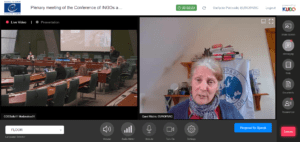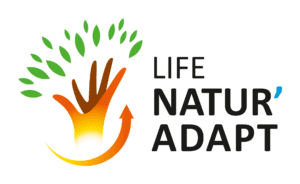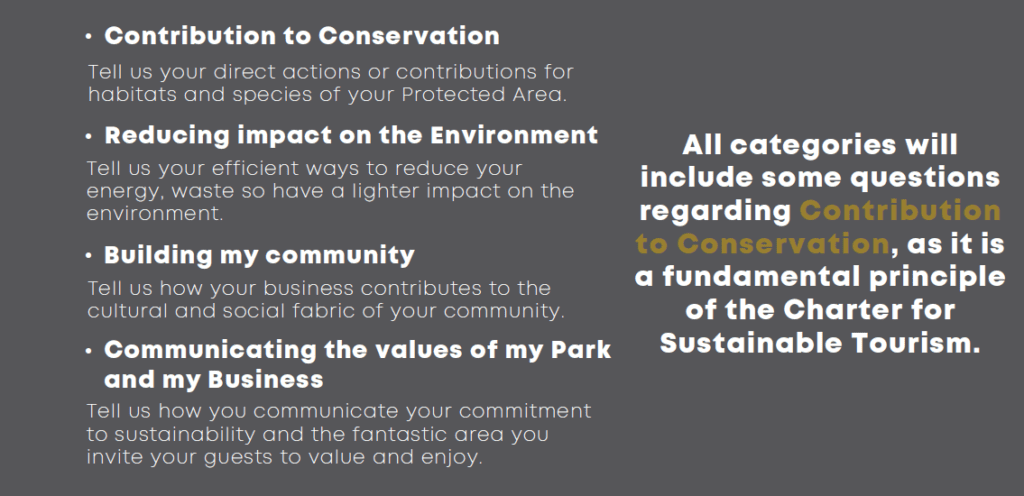Applications for the STAR Awards are now open!
The EUROPARC Star Awards is the biannual award given to Sustainable Tourism Partners that help protect our natural heritage.
Apply now for EUROPARC’s Sustainable Tourism Partners’ Award!
Tourism is one of the main economic drivers of Europe’s rural areas. EUROPARC has long recognised the need to ensure we have a thriving, living, working landscapes that support nature and people. Tourism, therefore, has to be developed and managed along with sustainable principles, if we are to ensure a positive future. Parks and Protected Areas are at the core of the natural and cultural assets of an area and are often the main reason for visiting.
However to be a Sustainable Destination, depends on businesses, community, and municipalities all working to that common purpose.
In these STAR Awards, EUROPARC seeks to celebrate, champion and acknowledge the effort and investments made by tourism businesses to be more sustainable and help care and protect their natural and cultural heritage.
To be less impactful on the environment in which the businesses reside, to work alongside the park, and to play a supporting role in the community are all the excellent actions of “Charter Partners”.
EUROPARC, therefore, invites all current Charter Partners and Tour Operators to apply for the awards in order to highlight the sustainable actions being done which are Good for Nature, Good for People and Good for Business.
>>> Download the Guidelines for Candidates <<<<
English – Guidelines for candidates
Español – Instrucciones para los candidatos
Italiano – Linee guida per i candidati
Français – Directives Destinées aux candidats
Who can apply?
Preview the questions below
- Contribution to Conservation
- Reducing the impacts on the Environment
- Building my Community
- Communicating the values of my park and my business
These will be assessed by an in-country jury and a representative from EUROPARC. The best from each country, in each category, will be adjudicated by an international jury who will select the overall winner in each category.
These will be announced at the EUROPARC Charter Award Ceremony 2021. Winners will be invited to attend the award ceremony at the European Parliament in Brussels, in late November/early December 2021 (Date to be confirmed).
The overall winner will receive, along with a representative from the Park or Protected Area with which they are a partner, a free place at the EUROPARC Conference 2022 or at the Charter meeting 2023.
For more information please contact: sustainable.tourism @ europarc.org.
Conference of International NGO’s – EUROPARC wins vote for new “Environment” committee
Gerhard Ermischer take over as newly elected President of the Conference of INGOs from Anna Rurka
EUROPARC has enjoyed International Observer (INGO)status with the Council of Europe since 2013, and has been an observer to the Bern Convention since the 1970s! As an INGO we are a member of the conference of INGOs, which can offer advice, support and comment to the other formal bodies in the Council of Europe.
A new committee for the Council of Europe!
Last year saw much welcome reforms to the Conference of INGOs paving the way for greater diversity and participation. There are few environmental NGOs with INGO status and hence topics around biodiversity loss, climate change and health rarely had space, despite the importance of the Bern Convention within the Council of Europe. EUROPARC therefore took the opportunity to propose a new thematic committee, working with colleagues in the heritage sector within the Conference of INGO’s to address these critical issues.
Voting for the president, vice president and standing committee of the conference as well as those for the creation of new committees took place this week.
EUROPARC is pleased to announce we were successful in that vote and our Executive Director was elected to chair this new Environment, Climate Change, Heritage and Health committee.
With the foundations of the Council of Europe being Human Rights, Democracy and the Rule of law, we want to bring the environmental consciences to these issue as well as highlight the relevance of these to the biodiversity, climate change and health debates.
With excellent support from CivilScape, European Association of Archaeologists EAA, European Environment Bureau, European Confederation of Youth Club Organisations (ECYC), European Council of Doctoral Candidates and Junior Researchers, and Friends of the Earth/ProNatura (who are EUROPARC members), we have formed the core of the committee and are yet seeking others to join us.
We will of course bring the experience and voice of our members into this committee, especially those members (i.e. those outside the EU27) for whom the Council of Europe and the Bern Convention is our main convening platform for matters of nature conservation.
Work will begin now to bring more members of the committee on board, but we will be looking to bring the issues from the nature conservation world, into the decision -making of the Council of Europe.

Executive Director Carol Ritchie highlighted the importance and need for a new committee addressing Environment, Climate Change, Heritage and Health in the Conference.
The conference voted for the committee with a large majority and MS Ritchie as it chair
European State of the Climate 2020 is now out!
Photo by Lucian Potlog from Pexels
This comprehensive review of last year’s climate data published by the European Commission, highlights that in 2020, greenhouse gas concentrations have not decreased. Average annual temperatures kept soaring and precipitation patterns have been disrupted. “Storm Alex”, the extreme climate event that left two valleys of Parc National du Mercantour in France in complete disarray is a sad but plain example.
Our most recent work shows that Protected Areas and the habitats, species and communities they shelter are at risk. Yet, as the best remnants of European nature and healthy socio-ecosystems, they play an important and ongoing part in climate regulation and mitigation. They offer natural solutions to mitigate and adapt to climate change negative effects and build a nature-inclusive climate-resilient society.
The European State of the Climate 2020
For the fourth time, the European State of the Climate (ESOTC) report was released. It is compiled by the Copernicus Climate Change Services (C3S), which is implemented by the European Centre for Medium-Range Weather Forecasts (ECMWF) on behalf of the European Commission. The ESOTC provides a detailed analysis of the past calendar year for Europe, as well as a short overview of the global context in 2020 and a focus on the Arctic.
Key Learnings
Many had possibly hoped that due to the COVID-19 crisis, emissions would decrease and allow for “a moment to breath”. The results are sadly underwhelming. Concentrations of greenhouse gases continued to increase and were in fact the highest measured by satellites since the start of observations in 2003. Overall, 2020 was the hottest year on record for Europe. Globally, it was one of the three warmest years ever recorded. Winter in northeastern Europe was exceptionally warm, with an average temperature that was nearly 1.9°C higher than the previous record in 2008. This, for example, resulted in unusually low sea ice cover in the northern part of the Baltic Sea and the Gulf of Finland and very few snow days in the area around the southern Baltic Sea.
Other abnormalities were related to precipitation, where a wetter-than-average winter transitioned into a dry spring in northwest Europe. Persistent dry conditions remained from spring through to autumn across western continual Europe. Additionally, river discharge was at its lowest since 1991 with high fluctuations throughout the year due to storm Alex among others.
The EU Climate Law
Reports like the ESOTC are important indicators for policy makers to help produce a roadmap to achieve their goals. The European Commission’s Green Deal strives to make Europe the first climate-neutral continent by 2050. To achieve that goal, an agreement on the European Climate Law was reached last week. Negotiators from the EU Parliament and Member States agreed to reduce net greenhouse gas emissions by “at least 55%” by 2030, compared to 1990 levels. That objective will therefore also become a legal obligation for the EU and its member states.
Protected Areas network, a keystone of climate-resilient societies
This report is highlighting the urgency to mitigate and adapt to the negative effects of climate change as the trend is not slowing down.
Climate change as well as global nature loss and degradation are currently affecting the very conditions upon which human communities and wildlife depend. Although local and regional assessments are required, Protected Areas are globally vulnerable to climate change. It causes disruptions in ecosystem structures and processes, directly or indirectly impacting species and biodiversity.
Yet, at the same time, Protected Areas offer solutions to tackle those twin challenges. As the best remnants of natural ecosystems, Protected Areas play an important and ongoing part in climate regulation and mitigation. They offer natural solutions and can actively contribute to the implementation, at multiple geopolitical scales, of the EU Biodiversity Strategy for 2030 and the EU strategy on climate change adaptation.
Helping Protected Areas adapt to climate change
As an active partner of LIFE Natur’Adapt, EUROPARC is helping and engaging its community of members to integrate climate change adaptation in their management practices.
With the support of a dedicated task force, EUROPARC is:
- Developing a policy brief for decision makers;
- Organising live exchanges among peers;
- Sharing knowledge and experience, which include the project’s latest results.
You can read all about the LIFE Natur’Adapt project here. If you have any experience or questions, do not hesitate to contact EUROPARC’s project manager, Olivier de Sadeleer [olivier.desadeleer@europarc.org]

You can find the ESOTC report here.
Fill out the survey on Outdoor Sports in Protected Areas
The webinar “Outdoor Sports: Engaging with or using nature?” that took place on 27 April 2021 publicly launched the new ERASMUS+ SEE project. As part of the project, we invite all EUROPARC members to complete the survey – available in 4 languages – on outdoor sports practice in Protected Areas!
Give us your inputs on Outdoor Sports in Protected Areas
In the last EUROPARC Webinar on Outdoor Sports in Protected Areas, we heard inspiring case studies from a variety of speakers. If you missed it, you can watch the recording here. Additionally, the webinar also launched a new ERASMUS+ project: the SEE project – standing for Sustainability and Environmental Education in Outdoor Sports, in which EUROPARC is one of the partners.
In the initial phase of the project, EUROPARC created a survey to collect inputs from Protected Areas across Europe. From the survey, we hope to learn about the various impacts of outdoor sports in nature and innovative practices to effectively manage them.
>>>>>>GO TO THE SURVEY<<<<<<
We invite EUROPARC members to take part and fill out the survey, as it will provide valuable inputs for a future toolkit for outdoor sport trainers and educators!
Who is the survey for?
The survey is addressed to Parks and Protected Area managers or other professionals who have management authority over a publicly accessible natural area where outdoor sports take place. That includes all sorts of Protected Areas including Periurban Parks, Marine Protected Areas, Biosphere reserves, National or Regional Parks etc. In case your institution is managing more than one Protected Area, we would like to kindly ask you to submit several surveys – one per each Protected Area.
A survey addressed to the Outdoor Sports sector will follow later and will be prepared by other SEE project partners.
Available in 4 languages!
The questionnaire is available in 4 languages (English, French, German and Spanish), it should take about 15 minutes and is open until the end of May. We might get back to some of the respondents later to follow up – for example if you share an interesting case study.

You can choose the language in the drop down menu in the top right corner.
The SEE project will then analyse the data and its outcomes should contribute to the preparation of a toolkit for outdoor sports trainers and educators in order to ensure a more sustainable, respectful and enjoyable outdoor sport experience.
We look forward to receiving your inputs!
Read more about the SEE project here.
If you have any questions, do not hesitate to contact michaela.kozminova@europarc.org .

